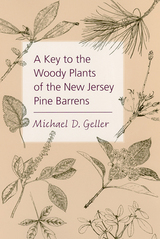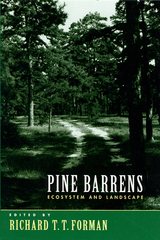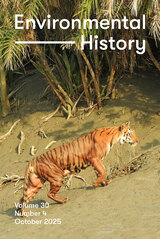
Within southern New Jersey lies the largest expanse of undeveloped land in the megalopolis between Boston and Washington, D.C. This is the Pine Barrens, our nation’s first National Reserve, where visitors are struck by how much the vegetation varies from surrounding areas. Because the sandy soil is only marginally suitable for most agriculture and because the location amounts to a peninsula, settlement has been limited and the current ecology is relatively untouched. However, as New Jersey’s population increases, people are looking to the Pine Barrens with a new interest.
A Key to the Woody Plants of the New Jersey Pine Barrens is a hand-illustrated, user-friendly guide for both the interested student and weekend naturalist. The key lists all of the woody plants of the Pine Barrens except for a few rare, non-native species. In several keys and more than fifty highly detailed drawings, Michael D. Geller describes the basic features of woody plants and explains how to identify plants both in summer and winter.
Along with his set of workable identification keys, the author provides an enjoyable introduction to the geology, ecology, and history of the region, and relates each to the unique flora of the Pine Barrens. The book provides readers with an effective means of identifying the plants that are hallmarks of one of the state’s last wild areas.

This seven-part book starts with a short discussion on location and boundaries of the New Jersey Pine Barrens. Part I covers human activities, from Indian activities and initial European perceptions of the land, including settlement, lumbering, fuel wood and charcoal, iron and glassworks, farming and livestock, and real estate development. The next part of the book describes sandy deposits, geographic distribution of geologic formations, and soil types with their ecologically important characteristics. Topics on hydrology, aquatic ecosystems, and climatic and microclimatic conditions are presented in the third part of this reference. Part IV traces the history of vegetation starting before the Ice Age and analyzes vegetation using different approaches, such as community types, community classification according to a European method, and gradient analysis. Plants of the Pine Barrens are briefly described and listed in Part V. The final part illustrates community relationships of mammals, birds, reptiles, amphibians, fish, arthropods, and soil microcommunities. The book is ideal for ecologists, botanists, geologists, soil scientists, zoologists, hydrologists, limnologists, engineers, and scientists, as well as planners, decision-makers, and managers who may largely determine the future of a region.
READERS
Browse our collection.
PUBLISHERS
See BiblioVault's publisher services.
STUDENT SERVICES
Files for college accessibility offices.
UChicago Accessibility Resources
home | accessibility | search | about | contact us
BiblioVault ® 2001 - 2025
The University of Chicago Press









